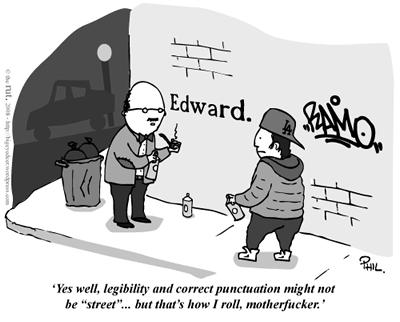"Correct" Language
 Different varieties of language in a single society are often ranked
Different varieties of language in a single society are often ranked
Some forms of language are usually considered "correct" and other forms "incorrect."
"Proper" language is not more logical or more beautiful, nor does it communicate more clearly than "improper" language. It's simply spoken by people who are wealthier and more powerful.
Next: Language and identity
From the point of view of linguistics, any language that can be understood is as good as any other. There is absolutely no reason, for example, why 'I don't have any' is superior to 'I ain't got none;" or "I'm about to leave" is superior to "I'm fixin to leave." These are just conventions of speech. Further, a great many parts of language don't follow any particular logic, they just are. For example, in English, questions often use what the linguist John McWhorter calls the 'meaningless do.' That is, for example, in virtually every other language in the world if you want to ask someone if they would like to go outside you say the equivalent of 'you want to go outside?' But to be grammatical in English you must say 'do you want to go outside? The word 'do' adds nothing to the sentence. McWhorter argues that it is the result of English's historic connection with Welsh, one of the very few other languages that have this feature.
Some of the common grammatical rules that many people are taught really make no sense at all. Many of these were developed in the 18th century by Latin scholars who thought that Latin was a more evolved language than English and that therefore English grammar should conform to Latin grammar. So, for example, when you arrive at a place and announce yourself should you say "It is me" or "It is I?" Historically, what people said was the first, but the second is what you should say if you need to be grammatically correct in Latin. There is no reason to use it in English. Similarly, the idea that you can't end a sentence with a preposition is directly imported from Latin (where because it is a 'pre-position' something must come after it). An quote attributed to Churchill says that the rule that a sentence cannot end with a preposition "is the kind of pedantic nonsense up with which I will not put."* The idea that you shouldn't split an infinitive (as in "to boldly go" should really be "to go boldly") is another bit of pedantry imported from Latin.
None of this is to say that we should stop teaching grammar entirely. It serves society well to have a rules and structures for formal writing. It facilitates communication by creating a standard mode of expression across disciplines and promotes equality. For example, you probably shouldn't be able to tell a person's class or ethnic background simply by reading a random essay they wrote for an anthropology class. On the other hand, we should understand that no way of speaking is intrinsically better or worse than another. We should understand that the way that people speak is not a measure of the quality of what they have to say.
-------------------
*An old joke that I kind-of like: A freshman is walking across the Harvard campus. They stop an upperclassman and ask "Hey, where's the gym at?" The upperclassman replies (in a very snooty accent) "At Harvard, we don't end our sentences with prepositions." To which the freshman responds "OK, where's the gym at, asshole."
 Different varieties of language in a single society are often ranked
Different varieties of language in a single society are often ranked